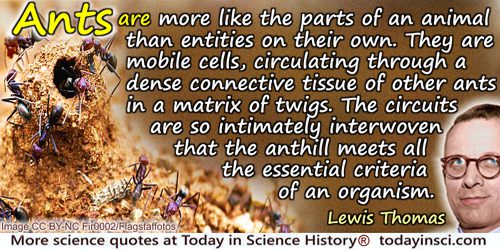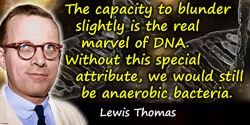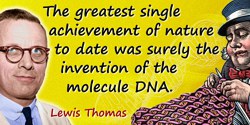 (source)
(source)
|
Lewis Thomas
(25 Nov 1913 - 3 Dec 1993)
American physician and author best known for his reflective essays on a wide range of topics in biology.
|
Lewis Thomas Quotes on Ant (16 quotes)
>> Click for 61 Science Quotes by Lewis Thomas
>> Click for Lewis Thomas Quotes on | DNA | Error | Gene | Knowledge | Language | Learning | Life | Mind | Nature | New | Science | Species | Truth | Universe |
>> Click for 61 Science Quotes by Lewis Thomas
>> Click for Lewis Thomas Quotes on | DNA | Error | Gene | Knowledge | Language | Learning | Life | Mind | Nature | New | Science | Species | Truth | Universe |
A poet is, after all, a sort of scientist, but engaged in a qualitative science in which nothing is measurable. He lives with data that cannot be numbered, and his experiments can be done only once. The information in a poem is, by definition, not reproducible. ... He becomes an equivalent of scientist, in the act of examining and sorting the things popping in [to his head], finding the marks of remote similarity, points of distant relationship, tiny irregularities that indicate that this one is really the same as that one over there only more important. Gauging the fit, he can meticulously place pieces of the universe together, in geometric configurations that are as beautiful and balanced as crystals.
— Lewis Thomas
In The Medusa and the Snail: More Notes of a Biology Watcher (1974, 1995), 107.
Animals have genes for altruism, and those genes have been selected in the evolution of many creatures because of the advantage they confer for the continuing survival of the species.
— Lewis Thomas
In Late Night Thoughts on Listening to Mahler’s Ninth Symphony(1984), 143.
Animals, even plants, lie to each other all the time, and we could restrict the research to them, putting off the real truth about ourselves for the several centuries we need to catch our breath. What is it that enables certain flowers to resemble nubile insects, or opossums to play dead, or female fireflies to change the code of their flashes in order to attract, and then eat, males of a different species?
— Lewis Thomas
In Late Night Thoughts on Listening to Mahler's Ninth Symphony(1984), 131.
Ants are more like the parts of an animal than entities on their own. They are mobile cells, circulating through a dense connective tissue of other ants in a matrix of twigs. The circuits are so intimately interwoven that the anthill meets all the essential criteria of an organism.
— Lewis Thomas
In 'Antaeus in Manhattan', The Lives of a Cell: Notes of a Biology Watcher (1974), 63.
Ants are so much like human beings as to be an embarrassment. They farm fungi, raise aphids as livestock, launch armies into wars, use chemical sprays to alarm and confuse enemies, capture slaves…. They exchange information ceaselessly. They do everything but watch television.
— Lewis Thomas
(1974) In 'On Societies as Organisms', A Long Line of Cells: Collected Essays (1990), 10.
I can think of a few microorganisms, possibly the tubercle bacillus, the syphilis spirochete, the malarial parasite, and a few others, that have a selective advantage in their ability to infect human beings, but there is nothing to be gained, in an evolutionary sense, by the capacity to cause illness or death. Pathogenicity may be something of a disadvantage for most microbes…
— Lewis Thomas
In 'Germs', The Lives of a Cell: Notes of a Biology Watcher (1974), 90.
Inexact method of observation, as I believe, is one flaw in clinical pathology to-day. Prematurity of conclusion is another, and in part follows from the first; but in chief part an unusual craving and veneration for hypothesis, which besets the minds of most medical men, is responsible. Except in those sciences which deal with the intangible or with events of long past ages, no treatises are to be found in which hypothesis figures as it does in medical writings. The purity of a science is to be judged by the paucity of its recorded hypotheses. Hypothesis has its right place, it forms a working basis; but it is an acknowledged makeshift, and, at the best, of purpose unaccomplished. Hypothesis is the heart which no man with right purpose wears willingly upon his sleeve. He who vaunts his lady love, ere yet she is won, is apt to display himself as frivolous or his lady a wanton.
— Lewis Thomas
The Mechanism and Graphic Registration of the Heart Beat (1920), vii.
It is in our genes to understand the universe if we can, to keep trying even if we cannot, and to be enchanted by the act of learning all the way.
— Lewis Thomas
It is not so bad being ignorant if you are totally ignorant; the hard thing is knowing in some detail the reality of ignorance...
— Lewis Thomas
In The Medusa and the Snail: More Notes of a Biology Watcher (1974, 1979), 74.
Montaigne simply turns his mind loose and writes whatever he feels like writing. Mostly, he wants to say that reason is not a special, unique gift of human beings, marking us off from the rest of nature.
— Lewis Thomas
In The Medusa and the Snail: More Notes of a Biology Watcher (1974, 1979), 147.
The cloning of humans is on most of the lists of things to worry about from Science, along with behaviour control, genetic engineering, transplanted heads, computer poetry and the unrestrained growth of plastic flowers.
— Lewis Thomas
In The Medusa and the Snail: More Notes of a Biology Watcher (1979), 51.
The most intensely social animals can only adapt to group behavior. Bees and ants have no option when isolated, except to die. There is really no such creature as a single individual; he has no more life of his own than a cast off cell marooned from the surface of your skin.
— Lewis Thomas
In The Lives of a Cell (1974), 63.
The need to make music, and to listen to it, is universally expressed by human beings. I cannot imagine, even in our most primitive times, the emergence of talented painters to make cave paintings without there having been, near at hand, equally creative people making song. It is, like speech, a dominant aspect of human biology.
— Lewis Thomas
In 'The Music of This Sphere', The Lives of a Cell: Notes of a Biology Watcher (1974), 25.
The only solid piece of scientific truth about which I feel totally confident is that we are profoundly ignorant about nature. ... It is this sudden confrontation with the depth and scope of ignorance that represents the most significant contribution of twentieth-century science to the human intellect.
— Lewis Thomas
In Medusa and the Snail: More Notes of a Biology Watcher (1974, 1979), 58.
This is the element that distinguishes applied science from basic. Surprise is what makes the difference. When you are organized to apply knowledge, set up targets, produce a usable product, you require a high degree of certainty from the outset. All the facts on which you base protocols must be reasonably hard facts with unambiguous meaning. The challenge is to plan the work and organize the workers so that it will come out precisely as predicted. For this, you need centralized authority, elaborately detailed time schedules, and some sort of reward system based on speed and perfection. But most of all you need the intelligible basic facts to begin with, and these must come from basic research. There is no other source. In basic research, everything is just the opposite. What you need at the outset is a high degree of uncertainty; otherwise it isn’t likely to be an important problem. You start with an incomplete roster of facts, characterized by their ambiguity; often the problem consists of discovering the connections between unrelated pieces of information. You must plan experiments on the basis of probability, even bare possibility, rather than certainty.
— Lewis Thomas
The Planning of Science, The Lives of a Cell: Notes of a Biology Watcher, (1974) .
We are profoundly ignorant about nature. Indeed, I regard this as the major discovery of the past hundred years of biology. It is, in its way, an illuminating piece of news.
— Lewis Thomas
Essay, 'The Hazards of Science', collected in The Medusa and the Snail: More Notes of a Biology Watcher (1979), 73.
See also:
- 25 Nov - short biography, births, deaths and events on date of Thomas's birth.
- The Lives of a Cell: Notes of a Biology Watcher, by Lewis Thomas. - book suggestion.
- Booklist for Lewis Thomas.




 In science it often happens that scientists say, 'You know that's a really good argument; my position is mistaken,' and then they would actually change their minds and you never hear that old view from them again. They really do it. It doesn't happen as often as it should, because scientists are human and change is sometimes painful. But it happens every day. I cannot recall the last time something like that happened in politics or religion.
(1987) --
In science it often happens that scientists say, 'You know that's a really good argument; my position is mistaken,' and then they would actually change their minds and you never hear that old view from them again. They really do it. It doesn't happen as often as it should, because scientists are human and change is sometimes painful. But it happens every day. I cannot recall the last time something like that happened in politics or religion.
(1987) -- 


